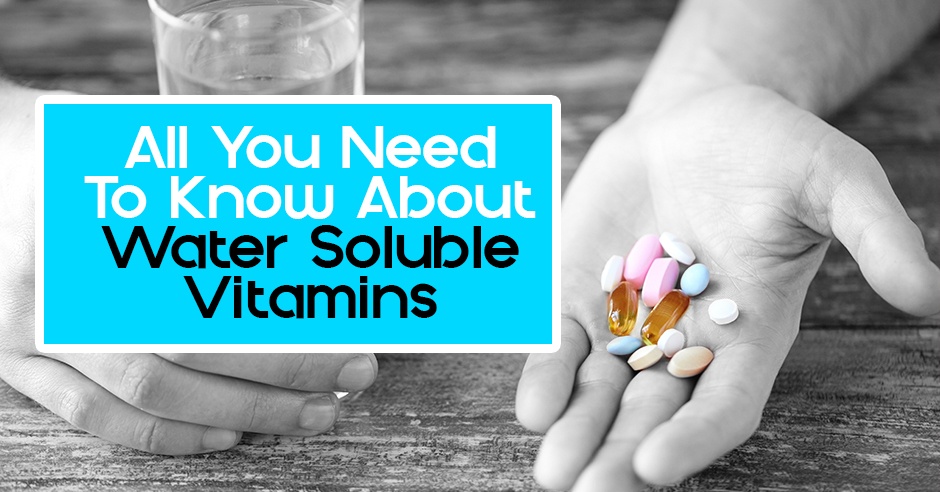Vitamins and supplements can make all the difference in health and well being. If you are deficient in one or more key nutrients, quality of life can quickly suffer. This puts a lot of pressure on vitamin manufacturers.
This is exactly what happened to Mary, a mother of three. Her energy levels had become low, and her immune system could no longer fight the bugs her kids sometimes brought home from school.
However, connecting with the right vitamins brought her back to health and vitality. In her case, the benefits of water soluble vitamins made all the difference.
Importance of Water Soluble Vitamins and Fat Soluble Vitamins?
With a little research, Mary learned that all vitamins generally fall into one of two categories: water soluble and fat soluble.
Fat soluble vitamins are absorbed into the blood stream, and excess is stored in the liver. Some examples of fat soluble vitamins include K, A, D and E.
By contrast, water soluble vitamins are absorbed via moisture in the body, and excess is not stored. Extra amounts of water soluble vitamins are eliminated via the urine.
Because of this, a steady supply is required to maintain optimal levels in the body. The most common water soluble vitamins taken today are vitamin C and the vitamin B-complex cluster.
The function of water soluble vitamins and fat soluble vitamins are similar.
The following is an overview of the crucial information Mary learned about these important water soluble vitamins:
Vitamin C
Vitamin C, also known as ascorbic acid, is a nutrient essential to immune system functioning and new tissue growth.
Mary resolved to ensure her family members take vitamin C regularly, especially while combating a cold, flu, infection or other immunity issue.
Vitamin C also assists in collagen synthesis for building new cells and tissues. It’s essential for wound healing, bone health, and the health of the teeth and gums.
Vitamin C works along with vitamin E as an important antioxidant, neutralizing free radicals and preventing damage at the cellular level.
Since our bodies are not able to create or store vitamin C, getting adequate amounts through diet and supplementation is crucial to good health.
Getting enough vitamin C is also linked with reduced risk of cancer, heart disease, cataracts and scurvy.
Food sources of vitamin C include citrus fruits, kiwi, strawberries, pineapple and bell peppers. However, Mary will always keep vitamin C on hand to ensure her family enjoys all its many health benefits.
B-Complex Vitamins
B vitamins comprise eight of the most important water soluble vitamins.
These include vitamin B1 (thiamin), vitamin B2 (riboflavin), vitamin B3 (niacin), pyridoxine (vitamin B6), folic acid, vitamin B12, pantothenic acid and biotin.
These key nutrients assist in areas that include helping the body to derive energy from food as well as in red blood cell formation, nervous system health, appetite regulation, vision and healthy skin.
Vitamin B1 (Thiamine)
Thiamine is essential in metabolizing amino acids and carbohydrates from food. It also regulates appetite and supports nervous system functioning.
Thiamine is present in peas, legumes and whole grains as well as meats like pork and liver.
Vitamin B2 (Riboflavin)
Riboflavin assists in metabolizing carbohydrates, fat and protein.
It also protects the cells, vision and skin health while enhancing vitamin B12 and niacin functioning. Riboflavin is found in eggs, milk, liver, green leafy vegetables, whole grains and legumes.
Vitamin B3 (Niacin)
Niacin helps the body metabolize fat and can assist in regulating cholesterol levels. It also supports skin health and assists in digestive system functioning. Food sources include poultry, fish, liver, peanuts and whole grains. Since Mary’s husband has high cholesterol, she is going to ask his doctor about niacin supplementation.
Vitamin B6
Vitamin B6 assists the body in metabolizing protein, carbohydrates and fat. It is a coenzyme that assists in chemical reactions in the body at the cellular level.
It also helps with amino acid creation, nervous system health, immune system support and the breakdown of stored glucose (glycogen).
Food sources include meat, whole grains, green, leafy vegetables and legumes.
Folic Acid
Folic acid is essential in DNA creation and health. It is essential that pregnant women get sufficient amounts of folic acid, and Mary took it throughout each of her pregnancies.
Folic acid is also instrumental in red blood cell health. This B vitamin is present in organ meats, green leafy vegetables, fish, legumes, whole grains and citrus fruit.
Vitamin B12
Vitamin B12 assists the body in metabolizing amino acids and fatty acids for DNA synthesis. It also supports red blood cell health and nervous system functioning.
Vitamin B12 is found in seafood, organ meats and dairy foods. It is not present in vegetables, so vegetarians and vegans should be cognizant of getting enough of this essential nutrient through supplementation.
Mary’s sister is a vegan, and she plans to ask her if she is getting enough vitamin B12 when they meet for lunch next week.
Pantothenic Acid
Pantothenic acid assists in metabolic processes and in digesting carbohydrates, fats and proteins.
It helps in the formation of hormones in the body. Pantothenic acid is found in meat, egg yolks, legumes and whole grains, and it is also manufactured in the gut.
Biotin
Biotin is another member of the B complex that assists the body with metabolic processes. It also helps the cells draw essential nutrients from carbohydrates, proteins and fats.
Biotin is present in organ meat, milk, egg yolks and whole grains.
After reading this water soluble vitamin list you can comprehend that these are crucial to a number of bodily processes.
A deficiency in any of these nutrients could result in symptoms that threaten health and quality of life. While they can be obtained through food sources, the most convenient way to ensure adequate levels is by taking vitamin C as well as a B complex vitamin.
Supplementation with these water soluble vitamins has boosted Mary’s energy levels and immune system. She is so grateful to have learned about the benefits of these essential vitamins. She plans to educate her children about the value and importance of good nutrition though diet and supplements.







